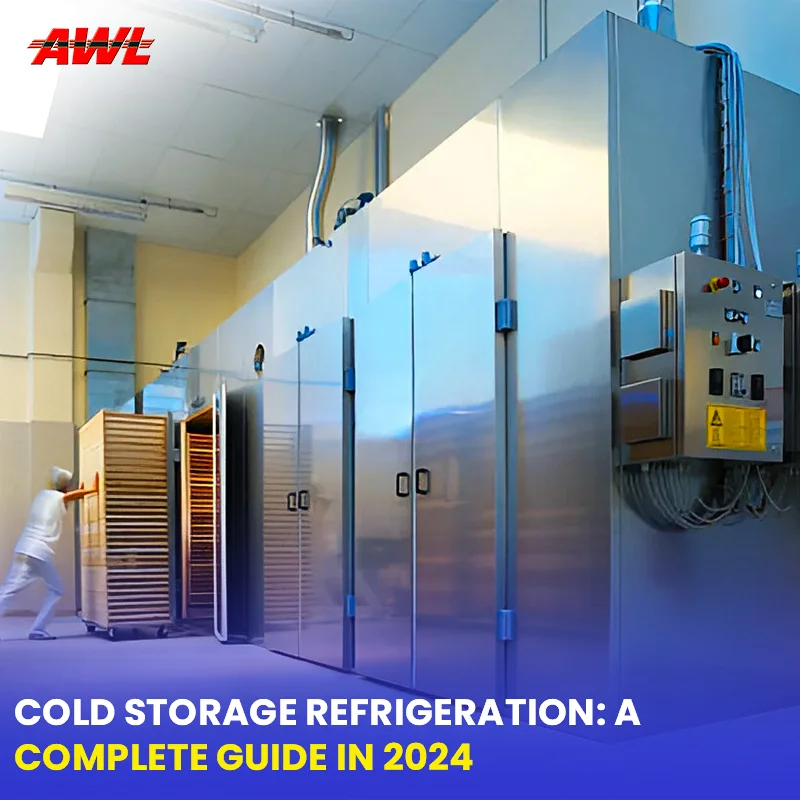

As supply chains adapt to meet rising consumer demand and a wider range of temperature-sensitive items, the value of specialized storage solutions becomes increasingly obvious. Cold storage warehouses are one such option that is vital to many businesses. This article goes into the topic of cold storage refrigeration warehousing, explaining what it comprises, its importance, its distinguishing traits, and how it helps a variety of industries ensure product quality and safety.
A cold storage refrigeration warehouse is a specialized storage facility that has temperature-controlled settings. Its principal duty is to store temperature-sensitive products, which are frequently perishable items such as fresh fruit, frozen meals, medicinal products, and so on, ensuring their quality and increasing their shelf life. Cold storage refrigeration facilities are divided into two types based on their maintained temperatures: refrigerated and frozen. Refrigeration warehouses, also known as chill stores, generally maintain temperatures ranging from 2 to 8 degrees Celsius to avoid cold loss. They are widely used to store fresh produce, dairy goods, and other perishable foods that need to be kept cold but not frozen.
On the other hand, frozen warehouses operate at sub-zero temperatures, which typically range from -18 to -25 degrees Celsius. These facilities are intended to keep frozen items, such as meats, seafood, and frozen desserts, which must be kept at low temperatures to avoid bacterial development and preserve product quality.
Cold storage warehouses' value and popularity have grown in recent years, owing to altering customer tastes, expanding populations, and increased expenditure, particularly on frozen food, probiotics, medications, and fresh fruit. Various businesses use Cold storage facilities to maintain the quality and safety of their products, including food and beverage, chemical products, medicines, and even technology. In the food business, for example, with rising demand for fresh and frozen items, cold storage refrigeration facilities have become critical for preserving product freshness and preventing spoiling. While freezing food does not kill hazardous bacteria, it does put them in a stasis, inhibiting further growth.
The pharmaceutical business relies extensively on cold storage to maintain the efficacy of temperature-sensitive medications and vaccines. Even the technology industry benefits from these facilities, since many components require cold storage refrigeration to work properly. Furthermore, globalization and developments in transportation logistics have resulted in an increasingly linked world in which items from one corner of the globe must be delivered to another. This phenomenon has raised demand for cold storage facilities to ensure that items reach customers in the best possible condition, maintaining the proper temperature regardless of distance.
While all cold storage warehouses serve the same objective of keeping items at regulated temperatures rather than ambient temperature storage, several variants are available to meet individual requirements. Cold storage refrigeration settings include:
These are owned and operated by major food manufacturers or merchants for their own purposes. They are frequently positioned near the company's manufacturing plant for ease and efficiency.
These facilities offer cold storage services to various clients. They are often managed by third-party logistics businesses, who provide flexible space and use options.
These portable cold storage refrigeration containers provide flexibility and mobility, allowing firms to move temperature-sensitive items across large distances without sacrificing quality.
Also known as flash freezers, are specialized facilities that rapidly drop the temperature of items in order to preserve them swiftly. They are extensively employed in the food business.
These refrigerated warehouses maintain temperatures as low as -80 degrees Celsius. They are commonly used for keeping medications and biological materials that require extremely low temperatures.
A well-designed and effectively maintained cold storage warehouse has many key characteristics that make it an essential part of the supply chain for temperature-sensitive items. Understanding these factors may help businesses choose the best cold storage warehousing partner and guarantee their products are stored securely and appropriately.
The ease with which vehicles may enter a cold storage refrigeration facility has a significant impact on its efficiency. A well-designed facility will have plenty of docking spaces to handle huge vehicles and trailers. Furthermore, the facility's architecture should allow for simple vehicle maneuverability, reducing loading and unloading time. Accessibility also includes the warehouse's physical location. It should be adjacent to important transportation networks, such as roads, seaports, or airports, to ensure that logistics and distribution activities run smoothly, efficiently, and cost-effectively.
Another important thing to consider is a cold storage warehouse's total capacity. Depending on your company's demands, you may want chilled warehouse space that can hold a variety of items. The ability of a warehouse to increase storage space has a substantial influence on a company's ability to satisfy seasonal needs or expand its product offerings. Additionally, the warehouse should be ready to handle a variety of items.
Streamlined inventory management is essential for ensuring product quality and reducing waste. Top-tier cold storage refrigeration facilities should have a strong inventory management system that ensures every product is accounted for, accurately placed, and effectively maintained. Such a system would incorporate improved tracking capabilities based on RFID or barcode scanning technology. It would also provide real-time inventory visibility, enabling for faster decision-making and more accurate forecasts. Furthermore, it should give insights on product shelf life so that commodities may be managed on a first-in, first-out (FIFO) basis, reducing the risk of spoiling.
Cold storage facilities require a consistent and stable power source to keep their cooling systems operational. Any power outage can have serious repercussions, such as product deterioration and significant financial losses. As a result, a cold storage warehouse must have a stable power infrastructure, including backup generators and power systems. The facility should also have measures in place to allow a quick reaction during a power outage, preventing temperature changes that might jeopardize the stored items. Cold chains are also looking towards net zero carbon emissions. Global initiatives are ongoing, with Australia and the United Kingdom at the forefront of temperature-controlled logistics.
The facility should have strict security measures in place to prevent theft, tampering, and unauthorized entry. It should also contain cool air. This might include safe airlock systems, as well as features like access control and controlled alarms. In addition to physical security, strong cybersecurity measures should be implemented to protect the warehouse's inventory management system and any other digital platforms. After all, the integrity of your data is just as vital as the physical security of your items.
AWL India being one of the top cold storage companies in India understands that the world of temperature-controlled warehouses is vast and sophisticated, with temperature control, storage capacity, power supply, and operating efficiency all being interconnected. Cold storage refrigeration facilities play an important role in the supply chain, ensuring the integrity of temperature-sensitive items and promoting worldwide trade. Despite the limitations of cold storage operations, such as the high cost of electricity, labor, and equipment maintenance, novel storage solutions and ongoing technology breakthroughs assist in enhancing efficiency and minimizing operational costs. Cold storage refrigeration warehouses are more than just storage facilities; they are ecosystems that require careful management. By selecting the appropriate storage solutions and adopting technology, these facilities may overcome obstacles, boost productivity, and fulfill the rising need for cold storage.
1. What is cold storage refrigeration?
Cold storage refrigeration refers to the technology and process of maintaining specific low temperatures within storage facilities to preserve perishable items. It's crucial for industries like food, pharmaceuticals, and logistics, to ensure products like fresh produce, vaccines, and sensitive medications remain safe, effective, and ready for distribution.
2. What do people store in cold storage?
In cold storage, people store a wide range of perishable items that require specific temperature control to maintain their quality and safety. This includes fresh fruits and vegetables, dairy products like milk and cheese, seafood, meat, vaccines, medications, and even certain chemicals and biological materials used in research and manufacturing. Cold storage ensures these items stay fresh, potent, and ready for consumption or use.
3. Is cold storage necessary for storing perishable goods other than food?
Absolutely! Cold storage isn't just about keeping food fresh. It's crucial for preserving the quality and effectiveness of a wide range of perishable goods beyond food. From vaccines and medications that need precise temperatures to remain potent, to flowers and plants that require cool environments to stay vibrant, cold storage ensures these items maintain their integrity until they reach their destination or are ready for use.
4. What is the main purpose of cold storage?
The primary purpose of cold storage is to maintain the quality and safety of perishable items by controlling temperature and humidity levels. It ensures that products like food, pharmaceuticals, and sensitive materials remain fresh, potent, and viable throughout storage and distribution, ultimately benefiting consumers and industries alike.
5. Are cold storage warehouses readily accessible for pharmaceutical storage in India?
In India, access to cold storage warehouses for pharmaceuticals varies by region and infrastructure development. Major cities and industrial hubs generally have better access, ensuring pharmaceuticals can be stored at precise temperatures critical for maintaining efficacy and safety. However, rural areas may face challenges due to limited infrastructure, impacting accessibility and distribution efficiency for temperature-sensitive medications and vaccines.

